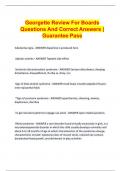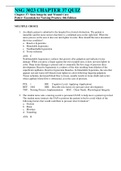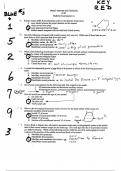Class notes
POLI 243 Lecture 14 Notes
- Course
- POLI 243 (POLI)
- Institution
- McGill University (Mcgillu)
POLI 243 Lecture 14 Notes: Canada's National Policy
[Show more]Some examples from this set of practice questions
1.
What were the consequences of Britain repealing the Corn Laws?
Answer: - Opened up their economy to international competition - Britain\'s economy would do very well in the 1850s/60s - Other countries saw this, and wanted to replicate it. - As a result, we saw classical liberalism spread from Britain other areas - ^this is a Constructivist explanation for why free trade was adopted elsewhere.
2.
What was the Elgin Treaty (1854)?
Answer: - Treaty between the United States and Canada (the British were still involved in negotiating these sorts of things, so it is not a surprise that the treaty stresses free trade, as Britain was pursuing free trade at home) - Builds off Repeal of the Corn Laws - Resolved some issues between the two countries - However, the United States would go down a different path (this was a function of the Civil War)
3.
What were Canada’s Endowments in the late 1800s?
Answer: Canada was relatively poor in capital and labor, but rich in land - Canada has a very small population relative to a huge amount of land. - In the 1870s, the prairie provinces did not exist yet; Canada had a great deal of land, and had to decide where to settle. Conflict occurred with Metis and other peoples living on those lands as Canada exercised authority over them. - In terms of capital per worker, Canada also scores low.
4.
What does the Stolper-Samuelson Model say about cleavages in Canada in the 1800s?
Answer: Stolper-Samuelson: urban/rural cleavage - Essentially the reverse of what we saw in Britain in the 1840s; there are two factors of productions that are relatively scarce (capital, labour) but rich in land. - Thus according to Stolper-Samuelson, it is the rural landowners that will desire free trade, while the people in the cities (capitalists, labourers) prefer protection.

Stuvia customers have reviewed more than 700,000 summaries. This how you know that you are buying the best documents.

You can quickly pay through credit card or Stuvia-credit for the summaries. There is no membership needed.

Your fellow students write the study notes themselves, which is why the documents are always reliable and up-to-date. This ensures you quickly get to the core!
You get a PDF, available immediately after your purchase. The purchased document is accessible anytime, anywhere and indefinitely through your profile.
Our satisfaction guarantee ensures that you always find a study document that suits you well. You fill out a form, and our customer service team takes care of the rest.
Stuvia is a marketplace, so you are not buying this document from us, but from seller claudiageorge. Stuvia facilitates payment to the seller.
No, you only buy these notes for CA$8.16. You're not tied to anything after your purchase.
4.6 stars on Google & Trustpilot (+1000 reviews)
65040 documents were sold in the last 30 days
Founded in 2010, the go-to place to buy study notes for 15 years now








